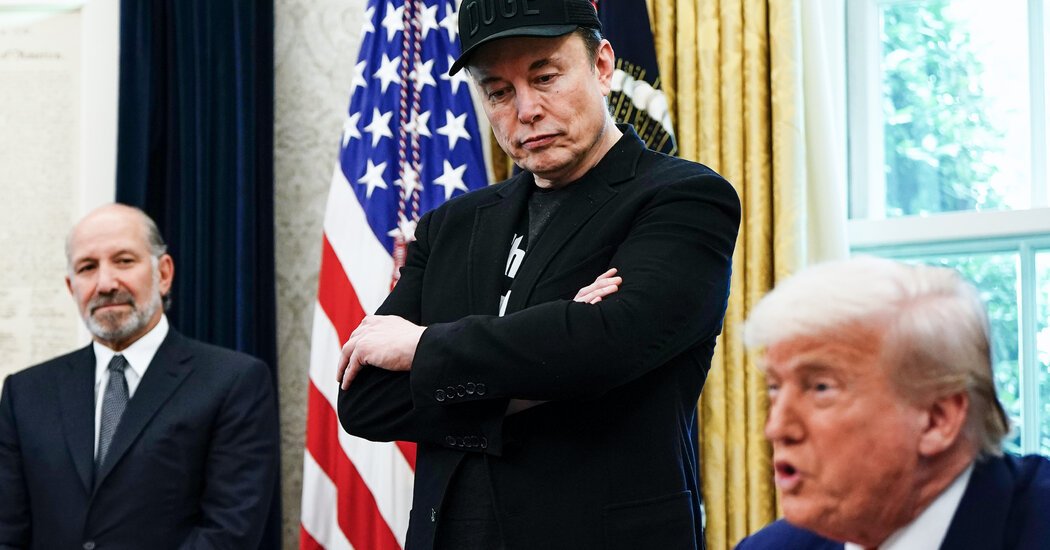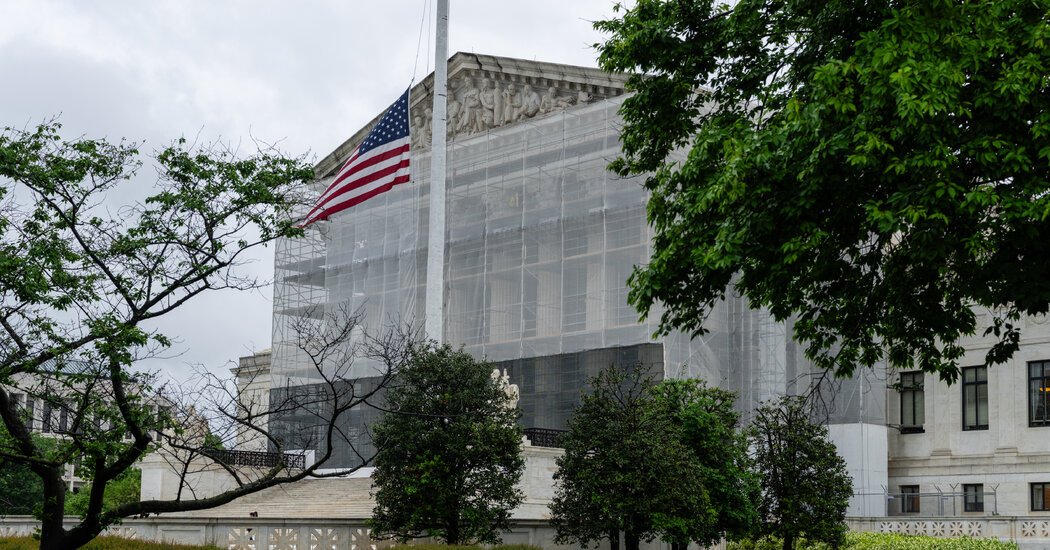Now Reading: Trump and Elon Musk Hold Oval Office News Conference: Live Updates
-
01
Trump and Elon Musk Hold Oval Office News Conference: Live Updates
Trump and Elon Musk Hold Oval Office News Conference: Live Updates

The Supreme Court on Friday allowed the Trump administration, for now, to revoke a Biden-era humanitarian program intended to give temporary residency to more than 500,000 immigrants from countries facing war and political turmoil.
The court’s order was unsigned and provided no reasoning, which is typical when the justices rule on emergency applications. It granted a request that will allow the administration to act even as an appeals court considers the case and, potentially, the justices review it again.
The ruling comes as the White House is stepping up pressure on the Department of Homeland Security to increase the pace of deportations and could speed efforts to remove thousands of migrants living legally in the United States.
The immediate practical impact of the court’s order, Justice Ketanji Brown Jackson wrote in a dissent joined by Justice Sonia Sotomayor, will have “the devastating consequences of allowing the government to precipitously upend the lives and livelihoods of nearly half a million noncitizens while their legal claims are pending.”
The ruling, which exposes some migrants from Cuba, Nicaragua, Venezuela and Haiti to possible deportation, is the latest in a series of emergency orders by the justices in recent weeks responding to a flurry of applications asking the court to weigh in on the administration’s attempts to unwind Biden-era immigration policies.
The court’s decision to side with the Trump administration, though a temporary order at an early stage in the litigation, is a signal that a majority of the justices believe the administration is likely to prevail in the case.
Justice Jackson indicated as much in her dissent, when she wrote that the Supreme Court should have kept the lower court’s pause in place, allowing people to maintain their immigration status for now “even if the government is likely to win on the merits.” Justice Jackson added that “success takes time” and that standards to block a lower court order “require more than anticipated victory.”
Friday’s ruling focused on former President Joseph R. Biden Jr.’s expansion of a legal mechanism for immigration called humanitarian parole. It allows migrants from countries facing instability to enter the United States and quickly secure work authorization, provided they have a private sponsor to take responsibility for them.
This month, the justices let the Trump administration remove deportation protections from nearly 350,000 Venezuelan immigrants who had been allowed to remain in the United States under a program known as Temporary Protected Status.
In a statement, Tricia McLaughlin, a spokeswoman for the Department of Homeland Security, called the Biden-era parole program “disastrous” and accused the previous administration of using it to admit “poorly vetted” migrants.
Lawyers for the immigrants said Friday’s decision would be devastating to thousands of people who had sought protection in the United States.
“The Supreme Court has effectively greenlit deportation orders for an estimated half a million people, the largest such de-legalization in the modern era,” said Karen Tumlin, the founder and director of the Justice Action Center, an immigrant advocacy group.
Humanitarian parole and Temporary Protected Status are two different mechanisms by which migrants from troubled countries can be temporarily settled in the United States. Humanitarian parole is typically obtained by individuals who apply on a case-by-case basis, while protected status is more often extended to large groups of migrants for a period of time. Individuals can hold both statuses at the same time.
Between the two rulings, the justices have agreed that, for now, the Trump administration can proceed with plans to deport hundreds of thousands of people who had fled war-torn and unstable homelands and legally taken refuge in the United States.
The use of humanitarian parole has a decades-long history. It was used to admit nearly 200,000 Cubans during the 1960s and more than 350,000 Southeast Asians after the fall of Saigon during the Vietnam War.
The Biden administration announced a humanitarian parole program in April 2022 for Ukrainians seeking to flee after the Russian invasion.
Biden officials then introduced the program for Venezuelans in late 2022 and for Cubans, Haitians and Nicaraguans in January 2023. With a stalemate in Congress over immigration and a sharp rise in border crossings, the programs cleared the way for hundreds of thousands of immigrants from those nations to enter the country legally.
Biden officials had hoped that the programs would encourage immigrants to fly to the United States and apply for entry in an organized fashion, instead of traveling north by foot and crossing the border illegally.
When the program was adopted for Venezuelans, official ports of entry had been closed to migrants since the start of the coronavirus pandemic, which had provided additional incentive for those intent on reaching the country to take more dangerous routes and cross the border illegally.
After the administration introduced its policy, Border Patrol apprehensions at the border of migrants from those countries dropped sharply.
Republican lawmakers have pushed back sharply against the humanitarian parole programs, arguing that they allowed migration by those who would not have otherwise qualified to enter the country.
Texas and other Republican-led states filed lawsuits while Mr. Biden was in office seeking to block the parole program, arguing that it burdened them by adding costs for health care, education and law enforcement. The courts upheld the programs’ legality.
President Trump moved to end the humanitarian parole programs for people from Cuba, Nicaragua, Venezuela and Haiti on his first day back in office.
So far, the Trump administration has not tried to revoke the status of 240,000 Ukrainians who received humanitarian parole, though it has paused consideration of new applications under that program.
Lawyers for migrants have sued. They argued that the termination of the humanitarian and other immigration parole programs was “contrary to law, arbitrary and capricious.”
A federal judge in Massachusetts temporarily paused the administration’s revocation of the program in April, finding that Homeland Security Secretary Kristi Noem lacked the authority to categorically revoke parole for all 532,000 people without providing individualized, case-by-case reviews.
On May 5, a three-judge panel in the U.S. Court of Appeals for the First Circuit upheld the lower court’s temporary block on the administration, finding that Ms. Noem had not made a “strong showing” that her “categorical termination” of humanitarian parole for all migrants was likely to survive a court challenge.
In an emergency application to the Supreme Court on May 8, Solicitor General D. John Sauer argued that Ms. Noem had “broad discretion over categories of immigration determinations” and that federal immigration law permitted the secretary “to revoke that parole” whenever its purposes had been served.
By blocking the Trump administration from ending the programs, the lower court had “needlessly” upended “critical immigration policies that are carefully calibrated to deter illegal entry” and had undone “democratically approved policies that featured heavily in the November election,” Mr. Sauer argued.
Lawyers for the immigrants filed a brief with the court arguing that Ms. Noem’s decision to end the parole protections “contravened express limits on her authority” and that siding with the Trump administration would “cause an immense amount of needless human suffering” for the immigrants.
The lawyers for the immigrants added: “All of them followed the law and the rules of the U.S. government, and they are here to reunite with family and/or to escape, even temporarily, the instability, dangers and deprivations of their home countries.”
Hamed Aleaziz contributed reporting.


















































